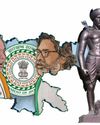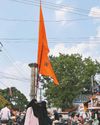
THE Supreme Court of India struck down the electoral bond scheme as “unconstitutional” right when political funding through the scheme had reached its peak. Electoral bonds sold in the last 10 months are worth more than one-third of what had been sold over the previous 63 months. Understandably so, as the elections are approaching.
The Constitutional Bench of the Supreme Court not only prohibited further issuance of such bonds, which allow donors to remain anonymous, but also ordered disclosure of donor and recipient details of all political funding through it. The Election Commission of India has to make the data public by March 13, according to the court’s orders.
The government did not want donor details to be revealed, arguing that it may adversely impact donors. However, the court prioritised transparency and upheld the people’s right to information regarding the sources of funds parties are receiving.
The scheme was controversial right from the beginning. At that time, the BJP was yet to gain a majority in the Upper House. It was introduced in the Parliament in 2017 as a Money Bill, which does not require the Rajya Sabha’s endorsement to become a law. While many opposition parties criticised the move, only the CPI (M) challenged it in court. The Association for Democratic Reforms (ADR) was among the other petitioners.
Civil society groups alleged that anonymous funding would expand the scope for corporate influence on government policy matters and that there would be no way for people to find out if there has been a quid pro quo relating to such funding. After all, funding has evidently come in the figures of crores.
This story is from the {{IssueName}} edition of {{MagazineName}}.
Start your 7-day Magzter GOLD free trial to access thousands of curated premium stories, and 9,000+ magazines and newspapers.
Already a subscriber ? Sign In
This story is from the {{IssueName}} edition of {{MagazineName}}.
Start your 7-day Magzter GOLD free trial to access thousands of curated premium stories, and 9,000+ magazines and newspapers.
Already a subscriber? Sign In

Trump's White House 'Waapsi'
Donald Trump's victory in the US presidential election may very well mean an end to democracy in the near future

IMT Ghaziabad hosted its Annual Convocation Ceremony for the Class of 2024
Shri Suresh Narayanan, Chairman Managing Director of Nestlé India Limited, congratulated and motivated graduates at IMT Ghaziabad's Convocation 2024

Identity and 'Infiltrators'
The Jharkhand Assembly election has emerged as a high-stakes political contest, with the battle for power intensifying between key players in the state.

Beyond Deadlines
Bibek Debroy could engage with even those who were not aligned with his politics or economics

Portraying Absence
Exhibits at a group art show in Kolkata examine existence in the absence

Of Rivers, Jungles and Mountains
In Adivasi poetry, everything breathes, everything is alive and nothing is inferior to humans

Hemant Versus Himanta
Himanta Biswa Sarma brings his hate bandwagon to Jharkhand to rattle Hemant Soren’s tribal identity politics

A Smouldering Wasteland
As Jharkhand goes to the polls, people living in and around Jharia coalfield have just one request for the administration—a life free from smoke, fear and danger for their children

Search for a Narrative
By demanding a separate Sarna Code for the tribals, Hemant Soren has offered the larger issue of tribal identity before the voters

The Historic Bonhomie
While the BJP Is trying to invoke the trope of Bangladeshi infiltrators”, the ground reality paints a different picture pertaining to the historical significance of Muslim-Adivasi camaraderie